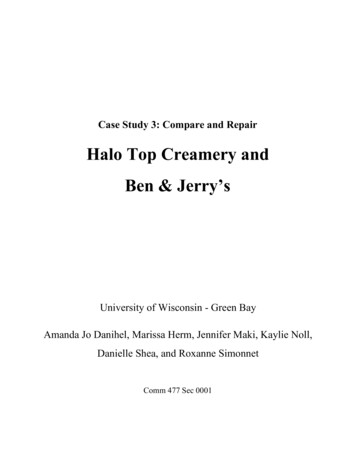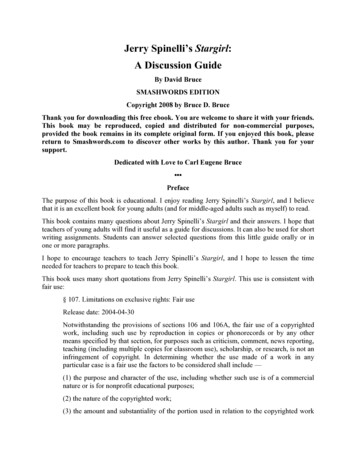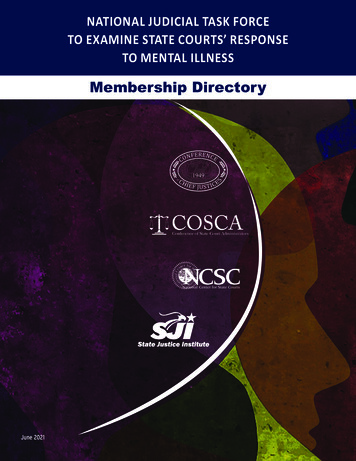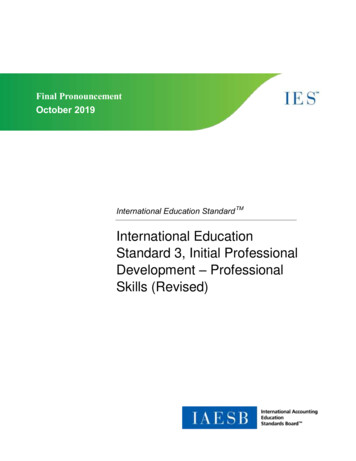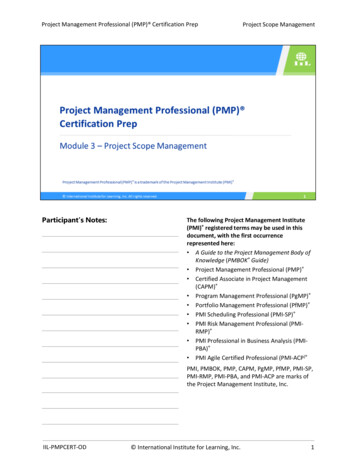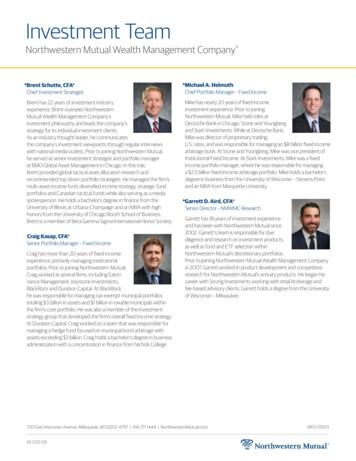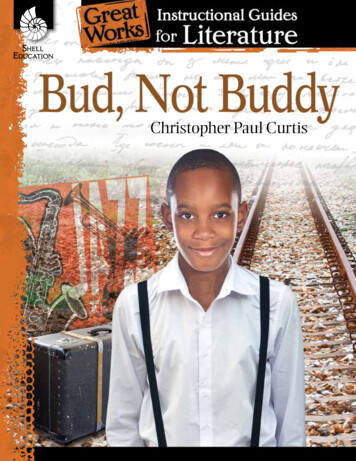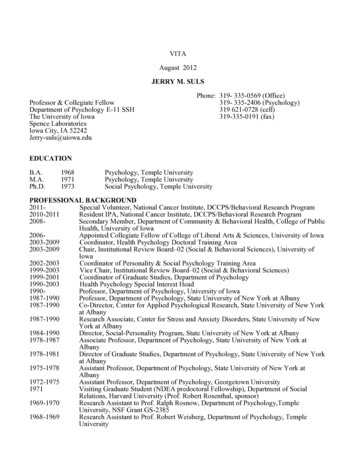
Transcription
VITAAugust 2012JERRY M. SULSProfessor & Collegiate FellowDepartment of Psychology E-11 SSHThe University of IowaSpence LaboratoriesIowa City, IA 52242Jerry-suls@uiowa.eduPhone: 319- 335-0569 (Office)319- 335-2406 (Psychology)319 621-0728 (cell)319-335-0191 (fax)EDUCATIONB.A.M.A.Ph.D.196819711973Psychology, Temple UniversityPsychology, Temple UniversitySocial Psychology, Temple UniversityPROFESSIONAL BACKGROUND2011Special Volunteer, National Cancer Institute, DCCPS/Behavioral Research Program2010-2011Resident IPA, National Cancer Institute, DCCPS/Behavioral Research Program2008Secondary Member, Department of Community & Behavioral Health, College of PublicHealth, University of Iowa2006Appointed Collegiate Fellow of College of Liberal Arts & Sciences, University of Iowa2003-2009Coordinator, Health Psychology Doctoral Training Area2003-2009Chair, Institutional Review Board–02 (Social & Behavioral Sciences), University ofIowa2002-2003Coordinator of Personality & Social Psychology Training Area1999-2003Vice Chair, Institutional Review Board–02 (Social & Behavioral Sciences)1999-2001Coordinator of Graduate Studies, Department of Psychology1990-2003Health Psychology Special Interest Head1990Professor, Department of Psychology, University of Iowa1987-1990Professor, Department of Psychology, State University of New York at Albany1987-1990Co-Director, Center for Applied Psychological Research, State University of New Yorkat Albany1987-1990Research Associate, Center for Stress and Anxiety Disorders, State University of NewYork at Albany1984-1990Director, Social-Personality Program, State University of New York at Albany1978-1987Associate Professor, Department of Psychology, State University of New York atAlbany1978-1981Director of Graduate Studies, Department of Psychology, State University of New Yorkat Albany1975-1978Assistant Professor, Department of Psychology, State University of New York atAlbany1972-1975Assistant Professor, Department of Psychology, Georgetown University1971Visiting Graduate Student (NDEA predoctoral Fellowship), Department of SocialRelations, Harvard University (Prof. Robert Rosenthal, sponsor)1969-1970Research Assistant to Prof. Ralph Rosnow, Department of Psychology,TempleUniversity, NSF Grant GS-23851968-1969Research Assistant to Prof. Robert Weisberg, Department of Psychology, TempleUniversity
RESEARCH INTERESTSSuls2Health Psychology/Behavioral Medicine: Psychosocial risk factors in etiology of coronary heart diseaseand cancer progression; Life stress, recovery and chronic illness; social norms and health behaviors;physical symptom interpretation and medical treatment seeking; cognitive impairment as a functionof cancer treatment; the complex patient.Mood and emotion: Stress and daily affective experience; personality and moodSocial Comparison Processes: Social Influence; Ability and Opinion Evaluation; Self-Evaluation.Methodology: Meta-analysis; Multi-level analysis; Integrative data analysis.AWARDS AND HONORSNDEA Fellow, 1969-1972.Elected to Society of Experimental Social Psychology, 1981.Elected to Academy of Behavioral Medicine Research, 1986.National Science Foundation Fellow for University of Iowa Summer Research Program in SocialPsychophysiology, May 31-June 27, 1987.Elected to Fellow Status, American Psychological Association, Division 8, 1987.Elected to Fellow Status, Society of Behavioral Medicine, 1992.Elected to Fellow Status, American Psychological Association, Division 38, 1995.Elected to Executive Council, Academy of Behavioral Medicine Research, 2004-2007; Re-elected forsecond term, 2008-2010.Elected as Member-at-Large, Division 38 (Health Psychology Division, APA), 2005-2008.Appointed Collegiate Fellow, College of Liberal Arts & Sciences, University of Iowa, 2006-2011; (reappointed) 2011-2016.Presidential Citation for Exceptional Service to Division 38, Health Psychology of the AmericanPsychological Association, August 12, 2006.Elected to Fellow Status, Association for Psychological Science, 2007Elected to Executive Committee, Society of Experimental Social Psychology, 2007-2010.President-Elect, Division 38 (Health Psychology) of American Psychological Association, 2008-09.President, Division 38 (Health Psychology) of American Psychological Association, 2009-2010.Master Lecturer, Society of Behavioral Medicine Annual Meeting, Seattle, WA, April 9, 2010.Outstanding Senior Contribution to Health Psychology Award by APA Division 38, Health Psychology,2012.GRANTS:
Suls3Research Associate, National Institute of Mental Health Grant, "Moral judgment and interpersonaljudgment in children" (LRO3MH26213-01), 1974-1975. Daniel C. Gutkin, Principal Investigator,Department of Psychology, Lafayette College."The role of incongruity and cueing in human appreciation." Faculty Research Grant from the ResearchFoundation of the State University of New York, Summer, 1976."Type A reactions to competition." Faculty Research Grant from the Research Foundation of the StateUniversity of New York, Summer 1980."Psychology for pre-medical students." Faculty Grant for the Improvement of Undergraduate Instructionfrom the Research Foundation of the State University of New York, Summer, 1981.Faculty Development Grant for Training in the Assessment of Type A Coronary-Prone Behavior Patter.Workshop conducted by Ray Rosenman, Margaret Chesney, and Michael Hecker, SRI International,Menlo Park, CA, September 16-18, 1983."Recent life events and illness among prison inmates." Contract with Federal Prison System, UnitedStates Department of Justice, 1983.Co-Investigator (15%, 1987; 20%, 1988-1990) "Psychological treatment of Irritable Bowel Syndrome"(Edward B. Blanchard, P.I.) NIDDK R01, 1987-1990; 475,000.Principal Investigator (30%) "Coronary-prone behavior, conventional CHD risk factors and reactivity."National Heart, Lung, and Blood Institute, R01 39118, 1988-1990, 138,200.Principal Investigator (25%) "Coronary-prone behavior and life stress." National Heart, Lung, and BloodInstitute, R01 HL46448, 1990-1994, 472,813. No cost extension to 8/95.Principal Investigator, "Investigations of the proxy social comparison model of ability self-evaluation"National Science Foundation, 1996-1999, 209, 983 plus REU Supplement, 1997-98: 4,000.Principal Investigator, "Role of gender and living arrangement in adaptation to coronary heart disease"American Heart Association-Iowa Affiliate, 1996-1998, 42,550; no-cost extension to 11/98.Co-Principal Investigator (with John Rapson, School of Music). “Emergence and Impact of the jazz avantgarde: A musicological and social psychological analysis.” Interdisciplinary research grant fromObermann Center for Advanced Studies, University of Iowa. Summer 2002, 9,000.Principal Investigator, “Investigations of the triarchic model of opinion comparison” National ScienceFoundation, 2000-2003, 212,932 (no cost extension 8/31/04).Principal Investigator, “Coping and social comparison in elderly cardiac patients,” National Institute ofAging, 1R21 AG024159-01A1, 2005-2007, no-cost extension 2008; 205,000.Principal Investigator, “Vulnerability beliefs and actions following a tornado disaster” National ScienceFoundation, BCS-SGER, 0634901, 2006-2007; no cost extension 2008, 98,216.Principal Investigator, “Helping Young Smokers Quit” (HYSQ) study (Evaluation of youth smokingcessation programs), Contract with WESTAT, University of Illinois-Chicago & Robert WoodJohnson Foundation, 65,622; December 2008-August 2009.Co-Investigator R01 (A.K. Johnson, PI) “The Stress of Chronic Disease: Mineralocorticoid Mediation ofMood,” NIMH, .60 person-months (CY); 2009-2014; 1,250.000.
Suls4Co-Principal Investigator (P.W. Windschitl, PI). “Joint Influences on Perceived Vulnerability andBehavior,” National Science Foundation, 2010-2014. ( 401,252)Intra-Agency Personnel Agreement with National Cancer Institute Division of Cancer Control andPopulations Sciences, August 23, 2010- August 22, 2011. ( 197,000).CONSULTANTSHIPS & NIH WORKSHOPS“Education et Formation: Effets de Contexte” (Education and Training: Context Effects), Prof. PascalHuguet (PI), University de Provence, from French Ministry of Education, 9/04-9/07.Senior Scientist, “Rumor Propagation: Modeling and Testing Dynamic Social Influence Mechanisms”Prof. Nicholas DiFonzo, PI, Rochester Institute of Technology, HSD- Dynamics of HumanBehavior Program, from National Science Foundation,; 8/06/05 to 8/06/08.Discussion Leader, NHLBI “Optimizing Stress-Reduction Interventions for Cardiovascular Disease RiskWorkshop”, September 27-28, 2010. Rockville, MD.Extramural Facilitator for Cognition and Emotion breakout session & Panelist, NIH OppNet: “ExpandingOpportunities in Basic Behavioral and Social Science Research,” October 28-29, 2010,Washington, DC.Invited Participant, “Behavioral, Population, Epidemiology & Prevention Provocative QuestionsWorkshop,” (Convened by Harold Varmus, Director of National Cancer Institute, February 4,2011, Bethesda, MD.Participant & Facilitator, “Cancer and Cognition: Basic Insights from Cognitive Science,” Board ofBehavioral, Cognitive and Sensory Sciences, The National Academies, Washington DC, May11, 2011 (Sponsored by NCI/BBPS Branch).Co-Organizer, NCI/BBPSB Workshop, “The Complex Patient: Perspectives from Cancer andCardiovascular Disease,” June 13-14, 2011, Park City Utah.Participant, “Affective Science and Cancer Control Workhop,” NCI, Basic Biobehavioral andPsychological Sciences Branch, Crystal City, VA, October 12-13, 2011.Co-Organizer, “Cognitive Effects of Chemotherapy Data Pooling Project Meeting,” NCI, BasicBiobehavioral and Psychological Sciences Branch, BRP, March 1-2, 2012, Rockville, MD.Participant, “Workshop on Emotion and Stress,” NCI, Basic Biobehavioral and Psychological SciencesBranch, BRP, April 30-May 1, 2012, Rockville, MD.PROFESSIONAL MEMBERSHIPSSociety of Experimental Social PsychologyAmerican Psychological Association - Divisions 8 and 38Society of Behavioral MedicineAcademy of Behavioral Medicine ResearchAssociation for Psychological ScienceAmerican Psychosomatic SocietyEDITORIAL POSITIONS AND PROFESSIONAL SERVICEEditor-in-Chief, 2006-: Social and Personality Psychology Compass.
Suls5(Online journal of peer-reviewed survey articles published by Wiley/Blackwell; with 10 topic sectionslaunched January 2008)Editor, 1998-2001: Personality and Social Psychology Bulletin (Official journal of the Society forPersonality and Social Psychology, published by Sage Publications.)Associate Editor, 1991-96: Journal of Personality and Social Psychology: Interpersonal Relations andGroup Processes (American Psychological Association journal)Editorial Boards:Health Psychology, 1983-1989; 1994, 1996, 2001-2005Journal of Personality and Social Psychology: Attitudes and Social Cognition, 1986-1990Journal of Behavioral Medicine, 1984-2004Journal of Personality and Social Psychology: Personality and Individual Differences, 1985, 20032009.Journal of Personality, 1985-1998Journal of Applied Social Psychology, 1986-presentAnnals of Behavioral Medicine, 2005-2009Health Psychology Review, 2005Motivation and Emotion, 2005Personality & Social Psychology Bulletin, 2009Journal of Applied Biobehavioral Research, 2011Editor for Special Issue:Journal of Personality on "Personality and Physical Health," Spring, 1987 with J. RittenhouseJournal of Personality on "Daily Experience and Personality," 1991 with H. Tennen and A. AffleckJournal of Personality on "Personality and Coping," 1996 with John H. Harvey.Society of Behavioral Medicine, Program Reviewer: 1987, 1990, 1991, 1992, 1999, 2000.American Psychological Association (APA)Member review committee, Division 8 Program, 1984, 1985, 1987Member review committee, Division 38 Program, 1984, 1987, 1988, 1998, 1999Program Chair, Division 38 for 1997 APA ConventionChair, Division 38 Committee on Research, 1997-1999Division 38 Liaison with Center for Advancement of Health, 1997-1999Chair, Ad Hoc Committee on Division 38 Web Site, 1999Chair, Publications Committee, APA Division 38, (2 terms): 1999-2003, 2004-2005Chair, Health Psychology Editor Selection Committee, Division 38, 2003-04Chair, APA Early Career Award in Health Psychology Selection Committee, 2005Member, Division 38 Nominations Committee, 2005-2006Member, APA Early Career Award in Personality & Social Psychology Selection Committee,2008.APA Education Directorate Capital Hill Visitor to Senator Tom Harkin, Chair of SenateAppropriations Labor, Health/Human Services, Education Subcommittee Supporting FY 2010Graduate Psychology Education Funding, March 5, 2009.Invited 2009 APA Division Leadership Conference, January 23-25, 2009, Washington DC.Invited 5th Annual Science Leadership Conference, November 14-16, 2009, Washington DC(Visited Senator Charles Grassley, Representative Tom Latham and Staff of Reps.David Loebsack, Leonard Boswell and Sen. Tom Harkin).APA Education Directorate Capital Hill Visitor to Staff of Senator Tom Harkin, Chair of SenateAppropriations Labor, Health/Human Services, Education Subcommittee & RepresentativeThomas Latham, Supporting FY 2011 Graduate Psychology Education Funding, March 18,2010.Chair, Awards Committee, APA Div. 38 (Health Psychology), 2011.
Suls6Co-Chair, Division 38 Health Psychology Journal Contract Negotiation Committee, 2011-2012.APA Education Directorate Capital Hill Visitor to Staff for Senator Tom Harkin, ,Representative David Loebsack, and Senator Grassley, Supporting FY 2013 GraduatePsychology Education Funding, February 13, 2012.Academy of Behavioral Medicine ResearchChair, Ad hoc Planning Committee, 2005-2006.Chair, Research Mentorship Committee, 2008-2010Member, Research Mentorship Committee, 2010American Psychosomatic SocietyConvention Review Committee, 2010; 2011Society of Experimental Social PsychologyChair, Scientific Impact Award Committee, 2009Member, Career Trajectory Award Committee, 2009Member, Program Committee, 2010Chair, Distinguished Scientist Award Committee, 2010Society of Personality & Social Psychology (Division 8, APA):Member, Distinguished Scholar Award Committee, 2012-2013.Society of Behavioral MedicineMember, Ad hoc Annals of Behavioral Medicine Contract Committee, 2012.GOVERNMENT CONSULTANTSHIPSAppointments:Appointed Member, Behavioral Medicine Study Section, National Institute of Health, 1983-1986.National Institutes of Health, National Reviewers' Reserve, 1987-1991.Appointed Member, Federal Bureau of Prisons Research Issues Forum, United States Department ofJustice, 1989-1994.Appointed Member, National Science Foundation, Social Psychology Advisory Panel, 1992-1995.Member, National Heart, Lung and Blood Institute Working Group on “Diagnosis and Treatment ofDepression in CHD Patients.” 2004-2005.Appointed Member, Behavioral Medicine Interventions and Outcomes Study Section, National Institutesof Health, 2004-2007.Appointed Member, Social Psychology Review Panel, National Science Foundation, 2006-2009.Invited Participant (Interlocutor) , National Cancer Institute Conference “Incorporating Innovative SocialPsychological Theory in Cancer Control Research,” September 5-7, 2007.Appointed Chair, Behavioral Medicine Interventions and Outcomes (BMIO) Study Section, NationalInstitutes of Health, 2007-09.Ad Hoc:Ad Hoc Member, Behavioral Medicine Study Section, National Institute of Health, 1982.
Member, Special Study Section, National Institutes of Health, April 9, 1984.Suls7Co-Chairperson, Planning Meeting for NIH-Behavioral Medicine Conference on Directions in BehavioralMedicine, February 8, 1984.Member, Special Study Section, NIH for Project Site Visits, University of Washington School ofDentistry, November 4-7, 1985.Chairman, NIH program Site Visit, University of Pennsylvania Cancer Control Center, January 9-10,1986.Reviewer, Arizona Disease Control Center, 1986, 1987.Chairman, Special Study Section, NIH, Arlington, VA, July 20, 1987.Member, Special Study Section, NIH, August 28, 1987.Chairman, NIH Site Visit Team and Ad Hoc Study Section, Cornell University Medical Center, NewYork City, October 19-20, 1987.Member, NIH Site Visit Team, University of Southern California School of Medicine, April 3-4, 1988.Chair, NIH Ad Hoc Study Section, July 21, 1988.Chair, NIH Ad Hoc Study Section, December 7, 1988.Ad Hoc Member, Behavioral Medicine Study Section, NIH, February 8-10, 1989.Chair, NIH Ad Hoc Study Section, April 14, 1989.Member, Special Study Section, Epidemiology and Disease Control-2, NIH, Washington, D.C., June 22,1989.Member, Special Study Section for Review of Applications Responding to RFA AG-89095, NIA,Washington, D.C., July 23-24, 1990.Chair, Special Ad Hoc Study Section, NIH, December 12, 1990.Consultant, Treatment of Inmates' Addictions to Drugs (TRIAD), Federal Bureau of Prisons, U.S.Department of Justice, 1990-1994.Ad hoc member, Behavioral Medicine Study Section, February 5-7, 1992.Panel member, Review Committee for Presidential Faculty Fellows Program, National ScienceFoundation, February 2-3, 1992.Ad hoc reviewer, National Cancer Institute, Administrative Supplements: The impact of cancer on thefamily, August 1999.Member, Breast Cancer Review Panel, U.S. Army Medical Research and Material Command(USAMRMC), October 1995.Participant, “Toward Better Theories of Health Behavior Workshop 2002, National Cancer Institute,Division of Cancer Control and Population Sciences, May 16-17, 2002, Inn of the Governors, SanteFe. New Mexico.
Temporary member, National Institutes of Health, Behavioral Medicine: Interventions and OutcomesStudy Section, February, June, & October 2003, February 2004, June 2004, October 2004.Suls8Member, NIH Special Emphasis Panel; Treatment Adherence in Sleep Apnea Patients, March 14, 2006.Member NIH Special Emphasis Panel, July 24, 2006Member, NHLBI Special Emphasis Panel to review PPG application, February 8, 2007.Chairperson, NIH Special Emphasis Panel, ZRG1 RPHB-K Interventions for Chronic Conditions, March8-9, 2007.Invited participant, Center for Scientific Review, NIH Social & Behavioral Sciences Workhshop, April25, 2007.Chairperson, NIH Special Emphasis Panel, ZRG1-RPHB-K, “Interventions for Cancer, Pain andCardiovascular Conditions,” July 12-13, 2007.Chairperson, NIH “Chronic Conditions: Interventions and Outcomes,” ZRG1 RPHB-K (03), October 23,2007.Invited Participant, NIH Center for Scientific Review, BBBP & RPHB Integrated Review Groups (IRG)Review meeting, January 7-8, 2009.Chair, NIH ZRG1 RPHB-E 95 Review Meeting, June 2, 2009.Member, NIH Special Review Meeting, ZRG1 RPHB-E, November 12, 2009.Ad hoc Member, NIH BMIO Study Section, June 2-3, 2010, Chicago, IL.TEACHING 2010-2011Semester/YearUndergradGradCourses TaughtFall 2011Faculty Development LeaveSummer 2011Leave of absence-Paid on IPA contract National Cancer InstituteSpring 2011Leave of absence-Paid on IPA sub contract from National Cancer InstituteFall 2010Leave of absence-Paid on IPA sub contract from National Cancer InstitutePUBLICATIONSSuls, J. M., & Weisberg, R. W. (1970). Processing syntactically ambiguous sentences. Journal ofExperimental Psychology, 86, 112-114.Rosnow, R. L., & Suls, J. M. (1970). Reactive effects of pretesting in attitude research. Journal ofPersonality and Social Psychology, 15, 338-343.Goldstein, J. H., Rosnow, R. L., Goodstadt, B., & Suls, J. M. (1972). The "Good Subject" in verbaloperant conditioning. Journal of Experimental Research in Personality, 6, 29-33.
Goldstein, J. H., Suls, J. M., & Anthony, S. (1972). Enjoyment of specific kinds of humor:Motivation or salience? In J. H. Goldstein & P. E. McGhee (Eds.), The psychology of humor. NewYork: Academic Press.Suls9Suls, J. M. (1972). A two-stage model for the appreciation of jokes and cartoons. In J. H. Goldstein& P. E. McGhee (Eds.), The psychology of humor. New York: Academic Press.Rosnow, R. L., Goodstadt, B., Suls, J. M., & Gitter, A. G. (1973). More on the social psychology ofthe experiment: When compliance turns to self-defense. Journal of Personality and Social Psychology,27, 337-343.Weisberg, R. W., & Suls, J. M. (1973). An information-processing model of Duncker's candleproblem. Cognitive Psychology, 4, 255-276.Suls, J. M. (1975). The role of familiarity in the appreciation of humor. Journal of Personality, 43,335-345.Suls, J. M. (1976). Misattribution and human appreciation: A comment on "Enhancement ofhuman appreciation by transferred excitation. Journal of Personality and Social Psychology, 34, 960-965.Suls, J. M., & Gutkin, D. C. (1976). Children's reactions to an actor as a function of expectationsand of the consequences received. Journal of Personality, 44, 149-162.Suls, J. M., & Miller, R. L. (1976). Humor as an attributional index. Personality and SocialPsychology Bulletin, 2, 256-259.Kane, T. R., Suls, J. M., & Tedeschi, J. (1977). Humour as a tool of social interaction. In A. J.Chapman & H. Foot (Eds.), It's a funny thing, humour. London: Pergamon Press.Miller, R. L., & Suls, J. M. (1977). Affiliation preferences as a function of attitude and abilitysimilarity. In J. M. Suls & R. L. Miller (Eds.), Social comparison processes: Theoretical and empiricalperspectives. Washington, D.C.: Wiley-Halsted.Miller, R. L., & Suls, J. M. (1977). Helping, self-attribution and the size of an initial request.Journal of Social Psychology, 103, 203-207.Suls, J. M. (1977). Cognitive and disparagement theories of humour. In A. J. Chapman & H. C.Foot (Eds.), It's a funny thing, humour. London: Pergamon Press.Suls, J. M. (1977). Gossip as social comparison? (Invited paper). Journal of Communication, 27,164-168.Suls, J. M. (1977). Social comparison theory and research: An overview from 1954. In J. M. Suls& R. L. Miller (Eds.), Social comparison processes: Theoretical and empirical perspectives. Washington,D.C.: Wiley-Halsted.Suls, J., & Miller, R. L. (Eds.) (1977). Social comparison processes: Theoretical and empiricalperspectives. Washington, D.C.: Hemisphere Publishing Company.Suls, J. M., & Miller, R. L. (1978). Ability comparison and its effects on affiliation preferences.Human Relations, 31, 267-282.Suls, J. M., Gastorf, J., & Lawhorn, J. (1978). Social comparison choices for evaluating a sex- andage-related ability. Personality and Social Psychology Bulletin, 4, 102-105.Suls, J. M., & Tesch, F. (1978). Students' preferences for information about their test performance:A social comparison study. Journal of Applied Social Psychology, 8, 189-197.
Suls10Kalle, R. J., & Suls, J. M. (1978). The relationship between emotional empathy and Kohlberg'smoral judgment stages. Bulletin of the Psychonomic Society, 11, 191-192.Suls, J. M., & Kalle, R. J. (1978). Intention, damage and age of transgressor as determinants ofchildren's moral judgments. Child Development, 49, 1270-1273.Suls, J. (1978). Estimating behavior-belief congruence for intoxicated individuals. Journal ofStudies on Alcohol, 39, 1299-1301.Gastorf, J., Suls, J., & Lawhorn, J. (1978). Opponent choices of below average performers.Bulletin of the Psychonomic Society, 12, 217-220.Gastorf, J. W., & Suls, J. (1978). Performance evaluation via social comparison: Related attributesimilarity vs. performance similarity. Social Psychology Quarterly, 41, 297-305.Suls, J., Gutkin, D. C., & Kalle, R. J. (1979). The role of intentions, damage and socialconsequences in the moral judgments of children. Child Development, 50, 874-877.Suls, J., & Kalle, R. (1979). Children's moral judgments as a function of intention damage, and anactor's physical harm. Developmental Psychology, 15, 93-94.Gutkin, D. C., & Suls, J. (1979). The relation between the ethics of personal conscience-socialresponsibility and principled moral reasoning. Journal of Youth and Adolescence, 8, 433-441.Suls, J., & Sanders, G. S. (1979). Social comparison processes in the young child. Invited paper,Journal of Research and Development in Education, 13, 79-89.Suls, J. M., Gaes, G., & Gastorf, J. (1979). Evaluating a sex-related ability: Comparison withsame- opposite-, and combined-sex norms. Journal of Research in Personality, 13, 294-304.Suls, J., Gastorf, J., & Witenberg, S. (1979). Life events, psychological distress and the Type ACoronary-Prone Behavior Pattern. Journal of Psychosomatic Research, 23, 315-319.Gastorf, J., Suls, J., & Sanders, G. S. (1980). Type A Coronary-Prone Behavior Pattern and socialfacilitation. Journal of Personality and Social Psychology, 38, 773-780.Suls, J., & Gastorf, J. (1980). Has the social psychology of the experiment influenced how researchis conducted? European Journal of Social Psychology, 10, 291-294.Suls, J., & Gastorf, J. (1981). The incidence of sex discrimination, sexual content and hostility intelevision humor. Journal of Applied Communication Research, 9, 42-49.Suls, J., & Rosnow, R. L. (1981). The delicate balance between ethics and artifacts in behavioralresearch. In A. Kimmel (Ed.), New directions for methodology of behavioral science (3): The ethics ofhuman subjects research. San Francisco: Jossey-Bass.Suls, J., Witenberg, S., & Gutkin, D. (1981). Developmental changes in evaluations of reciprocaland non-reciprocal pro-social behavior. Personality and Social Psychology Bulletin, 7, 25-31.Suls, J., & Mullen, B. (1981). Life change and psychological distress: the role of perceived controland desirability. Journal of Applied Social Psychology, 11, 379-389.Suls, J., & Mullen, B. (1981). Life events, perceived control and illness: The role of uncertainty.Journal of Human Stress, 7, 30-34.
Suls11Suls, J., Becker, M. A., & Mullen, B. (1981). Coronary-prone behavior, social insecurity and stressamong college-aged adults. Journal of Human Stress, 7, 27-34.Becker, M., & Suls, J. (1982). Test performance and the hard-driving and speed components of theType A coronary-prone behavior pattern. Journal of Psychosomatic Research, 26, 435-440.Mullen, B., & Suls, J. (1982). The effectiveness of attention and rejection as coping styles: A metaanalysis of temporal differences. Journal of Psychosomatic Research, 26, 43-49.Mullen, B., & Suls, J. (1982). "Know thyself": Stressful life changes and the ameliorative effect ofprivate self-consciousness. Journal of Experimental Social Psychology, 18, 43-55.Sanders, G., & Suls, J. (1982). Social comparison, self-evaluation and marriage. Journal ofMarriage and the Family, 44, 721-730.Sanders, G. S., & Suls, J. (Eds.) (1982). Social psychology of health and illness. Hillsdale, NJ:Erlbaum.Suls, J. (Ed.) (1982). Psychological perspectives on the self (Vol. 1). Hillsdale, NJ: Erlbaum.Suls, J. (1982). Social support, interpersonal relations and health: Benefits and liabilities. In G.Sanders & J. Suls (Eds.), Social psychology of health and illness. Hillsdale, NJ: Erlbaum.Suls, J., & Mullen, B. (1982). From the cradle to the grave: Comparison and self-evaluation acrossthe life-span. In J. Suls (Ed.), Psychological perspectives on the self (Vol. 1). Hillsdale, NJ: Erlbaum.Suls, J., & Sanders, G. (1982). Self-evaluation via social comparison: A developmental analysis. InL. Wheeler (Ed.), Review of personality and social psychology (Vol. 3). Beverly Hills, CA: Sage.Suls, J. (1983). Cognitive processes in humor appreciation. In P. E. McGhee & J. H. Goldstein(Eds.), Handbook of humor research (Vol. 1). New York: Springer-Verlag.Suls, J., & Fletcher, B. (1983). Social comparison in the social and physical sciences: An archivalstudy. Journal of Personality and Social Psychology, 44, 575-580.Suls, J., & Greenwald, A. G. (Eds.) (1983). Psychological perspectives on the self (Vol. 2).Hillsdale, NJ: Erlbaum.Witenberg, S. H., Blanchard, E. G., McCoy, G., Suls, J., & McGoldrick, M. D. (1983). Evaluationof compliance in home and center hemodialysis patients. Health Psychology, 2, 227-237.Witenberg, S. H., Blanchard, E. B., Suls, J., Tennen, H., McCoy, G.,. & McGoldrick, M. D. (1983).Perceptions of control and causality as predictors of compliance and coping in hemodialysis. Basic andApplied Social Psychology, 4, 319-336.Suls, J., & Mullen, B. (1983-84). Social and temporal bases of self-evaluation in the elderly.International Journal of Aging and Human Development, 18, 111-120.Suls, J. (1984). Levels of analysis and attempts to modify adolescent health behavior. HealthPsychology, 3, 371-375.Suls, J., & Fletcher, B. (1985). The relative efficacy of avoidant and non-avoidant coping strategies:A meta-analysis. Health Psychology, 4, 249-288. (To be reprinted in J. Weinman, M Johnston, & GerryMalloy (Eds.). Health Psychology: Sage Benchmark in Psychology Series, in press).Suls, J., & Fletcher, B. (1985). Self-attention, life stress and illness: A prospective study.Psychosomatic Medicine, 47, 469-481.
Suls12Suls, J. (1986). Comparison processes in relative deprivation. In J. Olson, M. Zanna & C. P.Herman (Eds.), Relative deprivation and social comparison: The Ontario Symposium (Vol. 4). Hillsdale,NJ: Erlbaum.Suls, J. (1986). Notes on the occasion of Social Comparison Theory's Thirtieth birthday.Personality and Social Psychology Bulletin, 12, 289-296.Suls, J., & Greenwald, A. G. (Eds.) (1986). Psychological perspectives on the self (Vol. 3).Hillsdale, NJ: Erlbaum.Suls, J., Sanders, G., & Labrecque, M. (1986). Attempting to control blood pressure withoutsystematic instruction: When advice is counterproductive. Journal of Behavioral Medicine, 9, 567-577.Suls, J., & Rittenhouse, J. D. (Eds.) (1987). Personality and Physical Health. Special Issue, Journalof Personality, 55.Suls, J., & Rittenhouse, J. D. (1987). Personality and physical health: An introduction. Journal ofPersonality, 55, 155-167.Suls, J., & Wan, C. K. (1987). In search of the false uniqueness phenomenon: Fear and estimates ofsocial consensus. Journal of Personality and Social Psychology, 52, 211-217.Suls, J., & Rosnow, R. (1988). Concerns about artifacts in behavioral research. In J. Morawski(Ed.), The rise of experimentation in American psychology. New Haven, CT: Yale University Press.Suls, J., Wan, C. K., & Sanders, G. (1988). False consensus and fa
Academy of Behavioral Medicine Research Chair, Ad hoc Planning Committee, 2005-2006. Chair, Research Mentorship Committee, 2008-2010 Member, Research Mentorship Committee, 2010- American Psychosomatic Society Convention Review Committee, 2010; 2011 Society of Experimental Social Psychology Chair, Scientific Impact Award Committee, 2009
